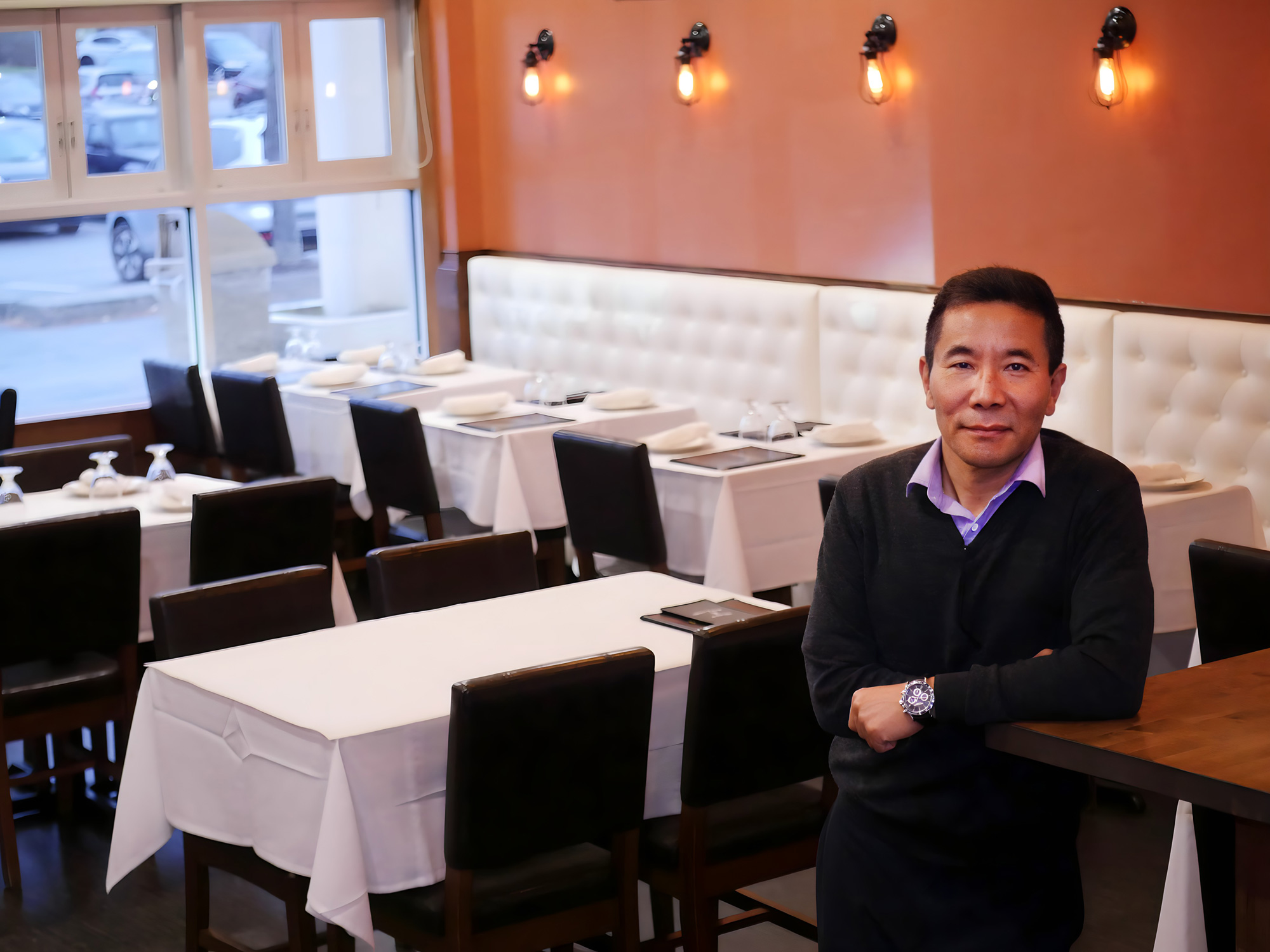Writing by Gia Miller
Photography by Justin Negard
It’s hard work running a restaurant, much less two. But the Jewel of Himalaya owner is perfectly suited for it — he’s worked tirelessly his entire life.
When Tshering T. Lama was five years old, his parents enrolled him in a boarding school. He lived in a small Nepalese village called Solukhumbu, and his school was located just over 89 miles away in Kathmandu.
“It took me seven days to get to school,” he remembers. “My parents and I walked for six days, and we took a bus for one day. Today, there are roads, so it only takes seven hours. And if your motorbike is really good, you could leave Kathmandu in the morning and have lunch in my town.”
Lama attended the boarding school for ten years, and when his younger sister turned five, she joined him. They returned home for two months each winter, always making the trek with their parents.
At school, he learned to speak English and fell in love with math and science. After graduation, Lama studied physics and math at Siddhartha Vanasthali Institute in the evenings while teaching during the day. He graduated in 1991, and his next step was college in the Philippines. He wanted to be an engineer.
But before continuing his studies, he received a letter from a “super cousin.”
“Her mom is my mom’s sister, and her dad is my dad’s brother,” he explains. “She cared for me when I was a kid.”
She told Lama she’d secured a visa for him to visit her in the U.S. She lived in Michigan, but he wanted to go to New York.
“I stayed with another cousin in Queens, and she came to visit me,” he remembers. “Then I started working. I was planning to go back to my country, but why? I learned something new here every day. I made more money here. The jobs were better here.”
A new path
His first job was working as “the cleaning guy” at a bakery. After one and a half years, he received a promotion and began mixing the dough.
“We would order 400 and 500 pounds of flour and mix it with water, salt and sugar,” he explains. “Then one day, we received a 50-pound bag of flour, and everyone was confused. They couldn’t figure out the ratios. But I love math, and for me, this was a simple calculation, so I did it in my head. Even my boss was surprised! He couldn’t figure it out either.”
Then Lama began making changes. From his first day mopping the bathroom floors, he couldn’t understand why they’d throw out dough that didn’t proof correctly. It was wasteful, and it made him mad. So, he taught them how to fold it into new dough and mix it again. Next, he tackled the pita bread. If it wasn’t perfectly round, they’d throw it out as well. Lama explained that they could turn it into breadcrumbs. After two years at the mixer, he became a supervisor.
“I recycled all the bread, and that made me happy,” he says. “You could pay me more money or less money, but it made me more happy when I saved some food. In my country, we always saved the food.”
Lama worked as a supervisor for two and a half years, and then one day, he began sneezing. Somehow, he had developed a flour allergy, and he had to quit.
He secured a job as a cashier at Healthy Pleasures in Union Square. When he wasn’t busy, he arranged the candy bars and beverages in the front of the store. Soon, he was promoted to managing the front of the store. He worked eight hours a day, seven days a week, but he wanted more. They obliged, and he began working 14 hours a day. During his downtime, he fixed the grocery shelves. Lama was promoted again, this time to floor manager.
“I worked long hours, and my goal was to save money,” he says. “I could easily save $600 out of an $800 paycheck.”
Lama finally moved out of his cousin’s apartment and rented a one-bedroom apartment in Astoria. It was $500 a month, and he shared it with a roommate and their seemingly endless assortment of guests.
“When people would move from Nepal, they needed a place to live,” he explains. “So, they would come stay with me at first, and I’d help them find a job and an apartment. At one point, I had nine people living in my one-bedroom apartment. They were everywhere, even sleeping on my living room floor. One day, I came home from work, and there was someone sleeping in my bed! They looked at me like I was the new guy, but it was my apartment! He was a friend of a friend, and he didn’t know. Today, that apartment is now a two-bedroom apartment, and they charge $2,900 a month.”
During that time, a vendor who sold goods to Healthy Pleasures told Lama that Basic Food, a health food store in Hoboken, was looking for a manager. He applied and got the job.

Building a life
In 1998, Lama was at a New Year’s Eve party when he saw a woman he recognized from his childhood, Lhakpa K. Sherpa. She moved to Oregon several years earlier to help her uncle with his newborn twins, but now she was in New York, living with a different uncle. He told her hello, and there was a spark.
“I’ve known her my whole life; we lived near each other in Solukhumbu,” he explains. “I know her whole family, and she knows my whole family.”
Lama began visiting Sherpa at her uncle’s house. A month later, during his weekly conversation with his parents, they told him it was time to marry her.
“My parents knew her and liked her,” he explained. “When I was 14 years old, they told me I should marry her. I didn’t at that time. But then we saw each other in New York, and my parents talked to her parents. Her parents said, ‘Okay, no problem.’ So, 1-2-3 boom! We were told to get married.”
One year later, they tied the knot in a small ceremony at a courthouse in Queens. Their wedding reception, however, was much larger. Held in a “Greek party hall in Astoria,” they celebrated with between 500 and 600 guests, most of whom lived in Queens and were from Nepal. It was such a large community event that it was covered in a local Indian paper.
He and Sherpa moved in together, and he reduced his work to six days a week. Their first child, a son, was born in 2002, and his parents came to stay with them for a year.
That next year, he began managing two health food stores, Hoboken FarmBoy and Tastebud’s Natural Foods in Staten Island, traveling back and forth between them and his home in Queens. His daughter was born in 2004.
In 2011, Lama earned his U.S. citizenship and purchased a five-bedroom home in Queens. The next step, he thought, would be to purchase the two stores he managed once his boss was ready to retire.

An unusual proposition
In 2018, Lama saw a distant cousin. He owned the Jewel of Himalaya restaurants in Scarsdale and Yorktown, and he wanted to sell the Scarsdale location to Lama. It was completely out of the blue.
“He told me he thought I’d be good at it because I had a background in food and I knew how to manage people,” he remembers. “I asked him how much he wanted to sell it for and what his profits were. I talked to my wife, and a week later, I decided to buy it.”
Two years later, he purchased the Yorktown location. His wife, who worked as a babysitter, became the manager of the Scarsdale location, and he manages the restaurant in Yorktown. He’s made some small changes to each restaurant, such as updating the decor, but the menu and the recipes have remained the same.
“It’s a winning formula, so why make changes,” he explains. “We serve food from Nepal, which is located between India and China. People who live near India eat a lot of foods with curry, and people who live near China eat a lot of dishes with noodles. So, we serve both.”
The most popular dishes, he says, are the chicken tikka masala and every type of dumpling. And, he points out, there are many popular vegetarian and vegan options on their menu as well.
His employees in both restaurants are all from Nepal, and he hopes to give them the same opportunities he has had. While they may begin as dishwashers, he believes they can learn new skills on the job and work their way up to becoming chefs.
Today, Lama considers himself more American than Nepalese because, he says, he’s lived in this country far longer. More importantly, he is proof that the American dream is possible. But it’s hard work, not luck, that makes it happen.
“Being an entrepreneur, being the boss, you have one hour off,” he says. “That’s one of the duties. Otherwise, forget it. When a holiday comes, I’m not off; I’m at work. It’s New Year’s Eve, and you’re enjoying dancing at a party. Me? I’m here. I’m always working. I work eight days a week.”
This article was published in the January/February 2024 edition of Connect to Northern Westchester
Gia Miller is an award-winning journalist and the editor-in-chief/co-publisher of Connect to Northern Westchester. She has a magazine journalism degree (yes, that's a real thing) from the University of Georgia and has written for countless national publications, ranging from SELF to The Washington Post. Gia desperately wishes schools still taught grammar. Also, she wants everyone to know they can delete the word "that" from about 90% of their sentences, and there's no such thing as "first annual." When she's not running her media empire, Gia enjoys spending quality time with friends and family, laughing at her crazy dog and listening to a good podcast. She thanks multiple alarms, fermented grapes and her amazing husband for helping her get through each day. Her love languages are food and humor.











